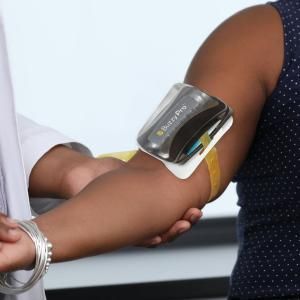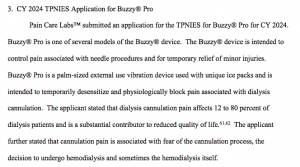Dialysis cannulation pain impacts half a million patients. Proven Buzzy device is now FDA indicated to control dialysis, blood donation & lab draw needle pain.
ATLANTA, GEORGIA, U.S., July 12, 2023/ EINPresswire.com / — Dialysis patients can now get more pain relief during treatment thanks to Buzzy’s recently expanded FDA indications. Pain Care Labs has received augmented Section 510(k) clearance from the United States Food and Drug Administration (FDA) for the Company’s patented, noninvasive Buzzy devices to control pain from dialysis.

“We already used the Buzzy bee for children, but not for adults. We did a little experiment to learn whether Buzzy would work on dialysis shunts,” explains Liesbeth de Boer, Nursing Improvement Advisor in Maastricht, Netherlands. “Several patients experienced less pain and were happy, so we introduced it in our dialysis department. Patients like the control of holding Buzzy in exactly the right spot for the best pain relief when the nurse places the needle.”

Based on feedback from healthcare professionals, the Company adapted the original Buzzy to work optimally for dialysis. Patented Buzzy Pro maximizes the mechanical stimulation and ice surface area to match an arteriovenous fistula or blood draw site.
Dialysis centers and home dialysis rarely provide topical anesthetic creams. “Creams take too long,” observes Amy Baxter, MD, “while reusable Buzzy works on contact.” Buzzy’s expanded indications include needle pain control for blood donation, lab draws, and dialysis.

Pain Care Labs has a pending application for coverage by Medicaid for dialysis patients to afford the Buzzy Pro pain relief device. Public comment for support or need with End-Stage Renal Disease (ESRD) is open through August 25, 2023. The ESRD rule is published, with the Pain Care Labs application summarized on page 149. Interested parties, whether dialysis patients, their family members, or healthcare providers, are invited to comment here: https://www.regulations.gov/docket/CMS-2023-0110/document
ABOUT PAIN CARE LABS
Pain Care Labs is the industry leader in non-invasive pain relief solutions. Established in 2006 by emergency physician and pain researcher Amy Baxter MD, the Company is dedicated to effective, reusable, drug-free pain solutions. Dr. Baxter speaks on public health topics including vaccine refusal (TEDMED) and the impact of needle fear on COVID vaccination (HHS). Most recently, she spoke at TED2023 about options instead of opioids after surgery. FDA-cleared Buzzy ® , the flagship product, has been used to block the pain from over 45 million needle procedures. FDA-cleared VibraCool ® relieves musculoskeletal pain from injury and overuse. The Company’s award-winning solutions are supported by over 80 independent clinical trials. The patented M-Stim ® neuromodulation platform gives power over pain.
ADDITIONAL LINKS
TEDMED 2014 https://www.tedmed.com/speakers/show?id=299214
HHS Testimony 2021 https://youtu.be/UXNTGFOlw-g
TED2023 https://conferences.ted.com/ted2023/speakers
SOCIAL TAGS
#BugsNotDrugs
#PowerOverPain
#OptionsNotOpioids
#WhatWorksForComfort
Raven Wilson
Pain Care Labs
+1 912-483-9490
email us here
Source: Dr. Amy Baxter and https://www.einnews.com/pr_news/643582048/control-dialysis-cannulation-pain-new-buzzy-pro-receives-fda-510k-indication

P: 404.221.0617
Fax: 404.448.3982
Email: admin@galifesciences.org
Address: 8607 Roberts Drive, Suite 250, Atlanta, GA 30350


